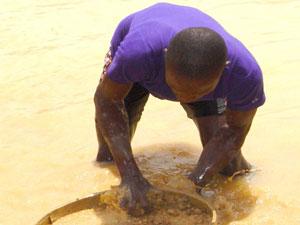Mining causes lead poisoning disaster in Nigeria
Image by USAID.
This story was originally reported by PRI's The World. For more, listen to the audio above.
While carrying out the country’s annual immunization program, officials realized there were hardly any children in several remote villages in northern Nigeria. The villagers said the children had died of malaria. But when a team from Doctors Without Borders administered blood tests, they discovered high concentrations of lead among the locals.
The outbreak was traced back to an informal mine near the villages, according to Richard Fuller of the Blacksmith Institute, a nonprofit helping in the villages. Local residents had been extracting gold from teh nearby ore source. The material, which turned out to be tragically high in lead, was then brought back to the villages in sacks and processed inside people's compounds. Children, of course, were playing nearby, as the women worked to extract the gold from inside of the ore. Fuller told PRI's The World:
Lead, at even low levels, causes long term neurological damage to children. At higher levels like this, it causes all kinds of terrible neurological acute problems with children in spasms, losing their ability to walk and talk. It’s not very often that you see levels that would actually lead to death, so the exposures here have just been really extraordinary. It’s quite an unprecedented situation.
The problems of informal mining aren't limited to Nigeria, however. According to OnEarth Magazine, illegal and informal mining may employ as many as 10 to 15 million people throughout the world. That includes some 600,000 child laborers.
Informal mining is dangerous work, and often uses toxic substances like mercury to get the gold out. The compensation is often meager and the damage caused to the environment is substantial.
As the villages in Nigeria are showing, the dangers of informal mining are not always known. According to Fuller, the amount of lead being found in people there is above the range of most of the equipment sent out to test people. So far, no one is quite sure the extent of the current outbreak. "We don’t really have numbers," Fuller told "The World," "but it will be thousands of children that will be exposed here."
PRI's "The World" is a one-hour, weekday radio news magazine offering a mix of news, features, interviews, and music from around the globe. "The World" is a co-production of the BBC World Service, PRI and WGBH Boston. More "The World."
Every day, reporters and producers at The World are hard at work bringing you human-centered news from across the globe. But we can’t do it without you. We need your support to ensure we can continue this work for another year.
Make a gift today, and you’ll help us unlock a matching gift of $67,000!
